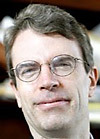Conservapedia: online reference that's read from right to right

Andy Schlafly was appalled. He was teaching a history class to home-schooled teens and one student had turned in an assignment that dated events as "BCE" -- before the common era -- rather than "B.C.," before Christ.
"Where did that come from?" he asked.
Her answer: "Wikipedia."
Schlafly knew he had to act. In his mind, the popular online encyclopedia -- written and edited by self-appointed experts worldwide -- was riddled with liberal bias. Dating events without referring to the New Testament was only one example.
How about Wikipedia's entry on golfer Zach Johnson, winner of the 2007 Masters? Nothing about how Johnson gave credit for his victory to Jesus Christ.
Thus was born Conservapedia.com, touted as "a conservative encyclopedia you can trust."
Schlafly, 46, one of Republican activist Phyllis Schlafly's sons, started small, urging his students to post brief -- often one-sentence -- entries on ancient history. He went live with the site in November. It has grown substantially, offering what he described as fair, scholarly articles. Many have a distinctly religious-right perspective.
Take the Pleistocene epoch. Most scientists know it as the ice age and date it back at least 1.6 million years. But Conservapedia calls it "a theorized period of time," a theory contradicted, according to the entry, by "multiple lines of evidence" indicating that Earth is less than 10,000 years old, as described in the Book of Genesis.
"We have certain principles that we adhere to, and we are up-front about them," Schlafly writes in his mission statement. "Beyond that, we welcome the facts."
With fewer than 12,000 entries and typos galore, Conservapedia isn't about to supplant Wikipedia, which boasts 1.8 million articles in English alone.
But the all-volunteer site has several thousand active readers and writers. Schlafly encourages students to use it as a reference. On the home page, just above the daily Bible verse, he tallies total views: 12.8million, and counting.
Conservapedia's critics for the most part have no problem with the articles heaping praise on President Reagan and former British Prime Minister Margaret Thatcher.
But they worry about material presented as fact in science and medicine entries that typically seeks to debunk evolution, condemn homosexuality and raise fears about abortion. They're also concerned that children will assume everything in it is authoritative.
Schlafly said students can follow the footnotes to find more information, but few links connect to dissenting -- or even mainstream -- views.
"The project specifically targets high-schoolers, and that's probably what I find most dangerous," said Andreas Kjeldsen, 27, a Danish graduate student who wrote several entries on medieval history before stopping in protest.
Many, perhaps most, of Conservapedia's articles are free of ideology. There are brisk, straightforward entries about hundreds of topics: the tuba, Claude Monet, Latvia, Robin Hood, polygons, the Renaissance.
But consider the entry on Hillary Diane Rodham Clinton (b. 1947). She "may suffer from a psychological condition that would raise questions about her fitness for office," namely, "clinical narcissism," Conservapedia asserts.
Evidence includes her "ever-changing opinion of the Iraq war." Although Schlafly demands that entries be rigorously footnoted, these sentences are not.
Schlafly called the armchair psychology "borderline in acceptability" for his site, but he defended the Clinton article on balance as "an objective, bias-free piece from a conservative perspective."
The point of his encyclopedia, he said, is to provide a different angle on the facts, ones a student researcher wouldn't necessarily find on Wikipedia or in the school library.
Schlafly, a Harvard-educated attorney who practices in Chester, N.J., does not know most of Conservapedia's contributors; they're spread across the world and communicate through online pseudonyms. He promotes writers he finds trustworthy to be systems administrators, who are able to block editors and protect certain articles from changes.
Even among this elite group, there's no ideological conformity. Terry Koeckritz doesn't take the creation account in the Book of Genesis literally, but he enjoys the site and spends hours writing articles on topics such as Fox News.
"It is what it is," said Koeckritz, 56, a computer consultant in Reno, Nev. "A family-friendly, Christian-friendly encyclopedia."
Articles change constantly, as most are open to editing by anyone online.
A glance at an entry's history -- which shows editing over time -- makes clear how quickly dissenting views are deleted.
Dr. Peter Lipson, an internist in Southfield, Mich., repeatedly tried to amend an article on breast cancer to tone down Conservapedia's claim that abortion raises a woman's risk. Administrators, including Schlafly, questioned his credentials and shut off debate.
After administrators blocked their accounts, Lipson and several other editors started their own Web site, RationalWiki.com. From there, they monitor Conservapedia. And -- by their admission -- engage in acts of cybervandalism.
Conservapedia's articles have been hit frequently by interlopers from RationalWiki and elsewhere.
The vandals have inserted errors, pornographic photos and satire, including this addition to an entry on Attorney General Alberto Gonzales: "Mr. Gonzales is a strong supporter of torture as a law enforcement tool for use against Democrats and third world inhabitants."
Such aggression has reinforced the view among some Conservapedia writers that left-wingers are out to suppress their free speech.
"I had heard it spoken of, but it had never really hit home before just how hostile they are," said a 15-year-old New Jersey girl whose mother asked that her name not be used.
The girl, who is home-schooled, wrote an article for Conservapedia on Irish dancing and uses the site to research papers. But the biggest lesson she's taken away as a young conservative is: "There are people who want to destroy us."
Environmentalists: "People who profess concern about the environment"; entry also notes that some want to impose legal limits on the use of toilet paper.
Femininity: The quality of being "childlike, gentle, pretty, willowy, submissive."
Minimum-wage increase: "A controversial manoeuvre that increases the incentive for young people to drop out of school."
Los Angeles Times